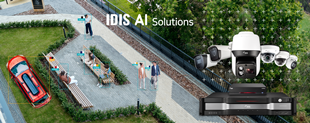Anna Sliwon-Stewart, Analyst II, Security at the research firm, suggests that the market for intruder alarms in the Middle East is fragmented, variable, and relatively unregulated, and so poses unique challenges for companies wishing to do business in the region, entailing deft navigation and handling of specific settings, circumstances, and conditions endemic to each country market.
For instance, Saudi Arabia, the largest market in the area, is unregulated, enabling the entry of a greater variety of suppliers whose product offerings, however, might be of variable or inconsistent quality. In contrast, the United Arab Emirates is highly regulated, helping drive demand for intruder alarm systems. In another example, outdoor sensors are common and widely deployed in Israel, but the sensors are not popular in Turkey because of their prohibitive cost.
In general terms, where the need exists for a security system, it is very often the case that access control systems are used in conjunction with video surveillance systems, leaving intruder alarms out of the equation. Instead, intruder alarms are installed mostly in very specific circumstances or in places holding high-value goods, such as jewellery stores or currency exchange shops.
Each country market also has its own regulatory framework—some precisely defined, others more loosely worded. This relatively slack framework can be challenging for companies trying to enter the Middle East, as they must satisfy the disparate regulatory requirements presented by each country market.
The residential market in the region is largely undeveloped, and only big villa-style houses invest in electronic security systems. Often a higher number of sensors per system is installed, and the use of video surveillance equipment is significant.
Last, the Middle East is a price-sensitive market. While the quality of a product is as important as its price, very often local end-users will choose mid range, more affordable brands able to meet all their expectations.
The research found that the intruder alarms market in the Middle East is fairly concentrated, with the top 5 suppliers in Saudi Arabia, the UAE, and Turkey accounting for anywhere from 65% to nearly 90% of market revenue. The No. 1 supplier was different for each country market, and no single company managed the feat of being at the top of more than one market.
Summary of findings by market:
Saudi Arabia
As the biggest country market, Saudi Arabia accounts for an estimated 22% of the total revenue for intruder alarms in the Middle East. The market is unregulated, and demand for intruder alarm systems is more likely to be inconsistent while being more strongly dependent on the purchasing capabilities of end-users.
To this end, intruder alarms sold in the Saudi market are the most expensive of the four countries examined in this report. This is also the case with equipment sold to the country’s residential market, which has the highest proportion of large single-family villas. The villas tend to be equipped with high-quality intruder alarm systems, which increasingly integrate home automation features, considered as additional luxury in this country. Use of wireless control panels and sensors is uncommon because of concerns over cyber security and signal disruption.
United Arab Emirates (UAE)
While the market for intruder alarms in the UAE is highly regulated, each of the seven constituent emirates of the UAE sets its own regulations. For instance, the Dubai emirate is alone in requiring Grade 3—that is, wired—products. The use of wireless sensors is allowed only in very few cases, such as when wiring proves difficult because of the presence or use of a sensor.
This means that manufacturers without a product solution able to supply all the required elements of an intruder alarm installation within Grade 3 specs will struggle to sell their product to installers and integrators. For their part, installers and integrators in the UAE are inclined to deploy equipment coming from just one provider to simplify installation and subsequent operations. However, manufacturers possessing only one or two Grade 3-certified products will find it all but impossible to compete with those who have a full suite of certified products.
Israel
The market for intruder alarms in Israel is highly regulated. Until recently, no wireless devices or systems have been accepted for insurance purposes, and those wishing for a house insurance policy were required to purchase a wired system.
However, new regulations are expected to be adopted in the coming months that will allow wireless sensors to be added to systems. Such a development could open the Israeli market to wireless products from foreign brands, whose offerings are well developed and are likely to meet the expectations of the Israeli populace. The new regulation could also reshape the domestic landscape, enticing local suppliers who export wireless products back to their home markets, increasing competition in the process and leading to lower wireless system prices fairly quickly.
Turkey
Intruder alarm systems with the EN certification are the most popular in this country because Turkey’s regulatory regime has been designed to emulate the standards set by the European Union, which it has long wanted to join. All alarm communicators, however, must be registered with the central government, which monitors all incoming as well as outgoing signals.
The intruder alarms market is concentrated in the biggest cities. In contrast, the communications infrastructure in the countryside is not well developed, and electronic security systems are considered too expensive. In the residential sector, systems with enabled cloud functionality are increasingly popular in the residential sector but outdoor sensors are not common because of their high cost.
Rest of the region
Kuwait, Oman, and Bahrain are countries with very small populations, which limits how far the market for intruder alarms can grow. The existing intruder alarms market in Oman is very traditional, with the systems expected to perform only the basic functionalities of alerting homeowners about intruders.
In Egypt, residential end-users prefer systems that enable them to connect smoke detectors with intruder alarm systems for prompt alerts about any incidents. Overall, the Egyptian security market requires sellers to have local expertise as well as advanced awareness of the global market.
Qatar fastest growing
The fastest-growing country market in the Middle East is Qatar, with market revenue forecast to increase at a compound annual growth rate (CAGR) of 16% from 2018 to 2023. Even so, a blockade imposed in June 2017 by Saudi Arabia, the UAE, Bahrain, and Egypt continues to this day, for Qatar to cut its alleged support of terrorism. Manufacturers of intruder alarms operating in Saudi Arabia and the UAE that serve customers in Qatar have been negatively affected by the political fallout among the countries. And until the crisis is resolved, only local installers with equipment supplied by companies located in countries other than the four will be able to work on new installations.
















